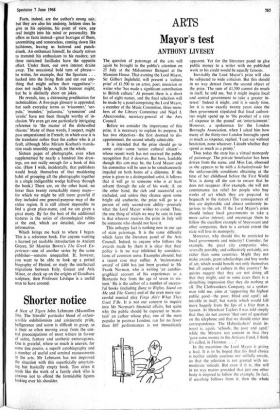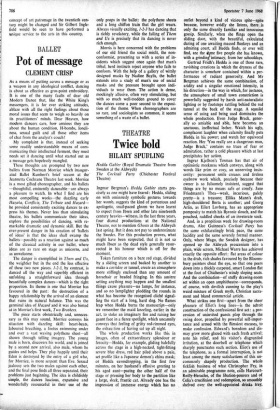Mayor's test ARTS
ANTHONY LIVESEY
The question of patronage of the arts will again be brought to the public's attention on 25 July at the Midsummer Banquet at the Mansion House. That evening the Lord Mayor, Sir Gilbert Inglefield, will present a 'culture prize' of f1,500 to an artist, poet, musician or writer who 'has made a significant contribution to British culture.' At present there is a short list of eight names, and the final selection will be made by a panel comprising the Lord Mayor, a member of the Music Committee, three mem- bers of the Library Committee and Nigel J. Abercrombie, secretary-general of the Arts Council.
Before we consider the importance of this prize, it is necessary to explain its purpose. It has two objectives—the first doomed to dis- appointment, the second wholly admirable.
It is intended that the prize should go to some artist—some 'senior cultural citizen'— whose recent work has not received the public recognition that it deserves. But here, laudable though this aim may be, the Lord Mayor and his committee will be seen to be simultaneously impaled on both horns of a dilemma. If the prize is given to a distinguished artist, it follows that it will go to someone who is at least solvent through the sale of his work; if, on the other hand, the rich and successful are excluded, and unless they chance upon some bright old anchorite, the prize will go to a person of only second-rate ability—precisely what the Lord Mayor wishes to avoid. Thus, the one thing of which we may be sure in June is that whoever receives the prize in July will be someone who should not have it.
This unhappy fact is nothing new in our age of state patronage. It is the same difficulty which faces the literature panel of the Arts Council. Indeed, to anyone who follows the awards made by them it is clear that their policy is in no way inhibited by considera- tions of common sense. Examples abound, but a recent case may suffice. A 'maintenance award' of f400 has just been granted to Mr Frank Norman, who is writing 'an autobio- graphical account of his experiences as a Barnardo boy from the age of seven to six- teen.' He is the author of a number of success- ful books (including Bang to Rights, Stand on Me and The Guntz) and of the even more suc- cessful musical play Fings Ain't What They Used T'Be. It is not our concern to inquire into Mr Norman's financial affairs, but quite why the public should be expected to 'main- tain' an author whose play, one of the most popular in postwar London, ran for no fewer than 897 performances is not immediately apparent. Yet for the literature panel to grve public money to a writer with no published work to his credit would be equally fatuous.
Inevitably the Lord Mayor's prize will also be subjected to wide criticism. But this should in no way detract from the second object of the prize. The sum of £1,500 cannot do much in itself, he told me, 'but it might inspire local and central government to take a greater in- terest.' Indeed it might, and it is surely time, for it is now exactly twenty years since the then government stipulated that local authori- ties might spend up to 'the product of a rate of sixpence in the pound' on 'entertainment.' However, a spokesman for the London Boroughs Association, when I asked him how many of the thirty-two London boroughs spent as much as sixpence, replied, 'I can say without hesitation, none whatever. I doubt whether they spend as much as a penny.'
Thus today the state has a virtual monopoly of patronage. The private benefactor has been driven from the scene, and Miss Lee, obsessed as she appears to be with a Schadenfreude for the unfavourable conditions obtaining at the time of her childhood before the First World War, is doing all she can to ensure that he does not reappear. (For example, she will not countenance tax relief for people who buy works of art which they are prepared to bequeath to the nation.) The consequences of this are deplorable and almost uniformly in- jurious to the arts. If the Lord Mayor's prize should induce local governments to take a more active interest, and encourage them to follow the excellent example of Stuyvesant and other companies, then to a certain extent the state will lose its monopoly.
Moreover, why should this be restricted to local governments and industry? Consider, for example, the great city companies who, severally possibly, and collectively certainly, are richer than some countries. Might they not make awards, grant scholarships and buy works of art, which would benefit not only themselves but all aspects of culture in this country? In- quiries suggest that they are not doing all that they might, and in some cases there is a disturbing impression that they do nothing at all. The Clothworkers Company, so a spokes- man told me, aims at 'supporting the highest public good—the poor, blind and aged'; ad- mirable in itself, but words which would fall more happily from the lips of a friar than a tycoon. At Merchant Taylors I was told simply that they do not answer 'that sort of question' on the telephone and that we should enter into correspondence. The Haberdashers' main in- terest is, again, 'schools, the poor and aged,' while the Mercers rest content in that they `gave some money to the Artisans Fund, I think it's called, in Florence. . .
In the meantime the Lord Mayor is giving a lead. It is to be hoped that his final choice is neither unduly cautious nor wilfully erratic, so that the selection is not greeted with im- moderate ridicule. But even if it is, this will in no way matter provided that just one other body is inspired to follow the example. In fact, if anything follows from it, then the whole concept of art patronage in the twentieth cen- tury might be changed and Sir Gilbert Ingle- field would be seen to have performed a unique service to the arts in this country.







































 Previous page
Previous page